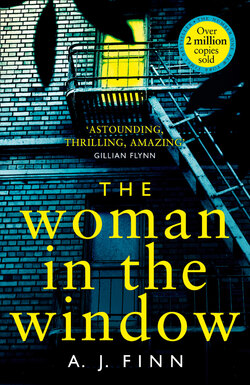Читать книгу The Woman in the Window - A. J. Finn - Страница 17
5
ОглавлениеTHE DEED OF SALE POSTED YESTERDAY. My new neighbors are Alistair and Jane Russell; they paid $3.45 million for their humble abode. Google tells me that he’s a partner at a midsize consultancy, previously based in Boston. She’s untraceable—you try plugging Jane Russell into a search engine.
It’s a lively neighborhood they’ve chosen.
The Miller home across the street—abandon all hope, ye who enter here—is one of five townhouses that I can survey from the south-facing windows of my own. To the east stand the identical-twin Gray Sisters: same box cornices crowning the windows, same bottle-green front doors. In the right—the slightly Grayer Sister, I think—live Henry and Lisa Wasserman, longtime residents; “Four decades and counting,” bragged Mrs. Wasserman when we moved in. She’d dropped by to tell us (“to your faces”) how much she (“and my Henry”) resented the arrival of “another yuppie clan” in what “used to be a real neighborhood.”
Ed fumed. Olivia named her stuffed rabbit Yuppie.
The Wassermen, as we dubbed them, haven’t spoken to me since, even though I’m on my own now, a clan unto myself. They don’t seem much friendlier toward the residents of the other Gray Sister, a family called, fittingly, Gray. Twin teenage girls, father a partner at a boutique M&A firm, mother an eager book-club hostess. This month’s selection, advertised on their Meetup page and under review right now, in the Grays’ front room, by eight middle-aged women: Jude the Obscure.
I read it too, imagined I was one of the group, munching coffee cake (none handy) and sipping wine (this I managed). “What did you think of Jude, Anna?” Christine Gray would ask me, and I’d say I found it rather obscure. We’d laugh. They’re laughing now, in fact. I try laughing with them. I take a sip.
West of the Millers are the Takedas. The husband is Japanese, the mother white, their son unearthly beautiful. He’s a cellist; in the warm months, he rehearses with the parlor windows thrown open, so Ed used to hoist ours in turn. We danced one night in some long-gone June, Ed and I, to the strains of a Bach suite: swaying in the kitchen, my head on his shoulder, his fingers knotted behind me, as the boy across the street played on.
This past summer, his music wandered toward the house, approached my living room, knocked politely on the glass: Let me in. I didn’t, couldn’t—I never open the windows, never—but still I could hear it murmuring, pleading: Let me in. Let me in!
Number 206–208, a vacant double-wide brownstone, flanks the Takedas’ house. An LLC bought it two Novembers ago, but no one moved in. A puzzle. For nearly a year, scaffolding clung to its facade like hanging gardens; it disappeared overnight—this was a few months before Ed and Olivia left—and since then, nothing.
Behold my southern empire and its subjects. None of these people were my friends; most of them I’d not met more than once or twice. Urban life, I suppose. Maybe the Wassermen were onto something. I wonder if they know what’s become of me.
A DERELICT Catholic school abuts my house to the east, practically leans against it: St. Dymphna’s, shuttered since we moved in. We’d threaten to send Olivia there when she misbehaved. Pitted brown stone, windows dark with grime. Or at least that’s what I remember; it’s been a while since I laid eyes on it.
And directly west is the park—tiny, two lots across and two deep, with a narrow brick path connecting our street to the one directly north. A sycamore stands sentry at either end, leaves flaming; an iron fence, low to the ground, hems in both sides. It is, as that quotable broker said, very quaint.
Then there’s the house beyond the park: number 207. The Lords sold it two months ago and promptly cleared out, flying south to their retirement villa in Vero Beach. Enter Alistair and Jane Russell.
Jane Russell! My physical therapist had never heard of her. “Gentlemen Prefer Blondes,” I said.
“Not in my experience,” she replied. Bina’s younger; perhaps that’s it.
All this was earlier today; before I could argue with her, she laced one of my legs over the other, capsized me onto my right side. The pain left me breathless. “Your hamstrings need this,” she assured me.
“You bitch,” I gasped.
She pressed my knee to the floor. “You’re not paying me to go easy on you.”
I winced. “Can I pay you to leave?”
Bina visits once a week to help me hate life, as I like to say, and to provide updates on her sexual adventures, which are about as exciting as my own. Only in Bina’s case it’s because she’s picky. “Half the guys on these apps are using five-year-old photos,” she’ll complain, her waterfall of hair poured over one shoulder, “and the other half are married. And the other half are single for a reason.”
That’s three halves, but you don’t debate math with someone who’s rotating your spine.
I joined Tinder a month ago “just to see,” I told myself. Tinder, Bina had explained to me, matchmakes you with people whose paths you’ve crossed. But what if you haven’t crossed paths with anyone? What if you forever navigate the same four thousand vertically arranged square feet, and nothing beyond them?
I don’t know. The first profile I spotted was David’s. I instantly deleted my account.
IT’S BEEN four days since I glimpsed Jane Russell. She certainly wasn’t proportioned like the original, with her torpedo breasts, her wasp waist, but then neither am I. The son I’ve seen only that once, yesterday morning. The husband, however—wide shoulders, streaky brows, a blade of a nose—is on permanent display in his house: whisking eggs in the kitchen, reading in the parlor, occasionally glancing into the bedroom, as though in search of someone.
